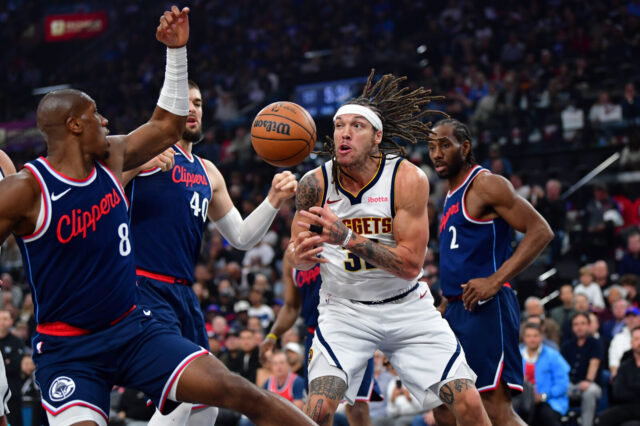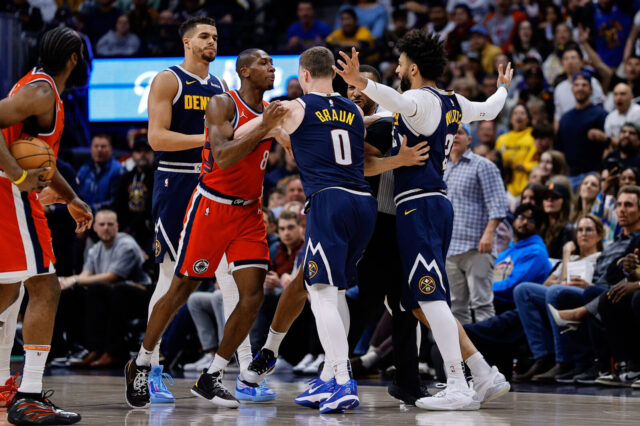The NBA has released each team’s game schedule, meaning not only are we finally closer to the 2017-2018 season starting, but we can also get a better outlook of the upcoming season and use it to (foolishly?) analyze and predict how we think our favorite team will perform.
For the Denver Nuggets, this season represents a critical point in the current era of the franchise. The team has missed the postseason for four years running now, and after coming so close last year to miss the playoffs yet again would be a disaster. However, outside of Western Conference shoe-ins Golden State, San Antonio and Houston, on paper there are at least eight legitimate teams (Oklahoma City, Minnesota, Los Angeles Clippers, Denver, Utah, Memphis, New Orleans, Portland) contending for the five remaining spots. And with Jimmy Butler and Paul George bolstering Minnesota and Oklahoma City, things have not gotten easier for Denver.
With that, let’s take a look at how the Nuggets’ schedule stacks up against the others.
Strength of Schedule
Based on opponent’s 2016-17 win/loss percentage, the Nuggets have the sixth most difficult schedule in the entire league. Fortunately, the rest of the playoff contenders listed above all sit relatively close to Denver: Minnesota is 8, Utah is 9, Memphis is 10, Oklahoma City is 11, Portland is 13. The outliers are New Orleans who face the second toughest schedule in the NBA, and the Clippers who sit at number 18.
When it comes to it, however, the differences in percentage points between the teams are meager and ultimately each team faces a pretty even schedule in difficulty. Of course, with how the landscape of the NBA changed so much just this summer these readings are likely to not be accurate at all.
The Nuggets need to get off to a hot start..
The Nuggets start off with a fairly easy October, November and December before really getting to the grind in the middle and end of the season. As shown in the graphic, Denver’s opponent win percentage is .488 and .475 for Oct/Nov and Dec before jumping into over .500 for the rest of the year, minus the six games in April.
Interestingly, Utah goes from the easiest Oct/Nov to the hardest December before evening out over the rest of the year. Portland will have a really tough last three months (too bad, so sad) and the Thunder and Pelicans finish off the with two hardest Aprils. The rest of the teams seem fairly average, with a few tough months thrown in there.
…because the second half will make or break the season
The last three months of Denver’s schedule is brutal in a variety of ways. First, Denver’s February opponents had a combined win percentage of .609 last season, which is by far the toughest month for any NBA team over the next season. In February the Nuggets play San Antonio twice, Houston twice, and Golden State, Oklahoma City and the Clippers once. The only saving grace for the month of February is that only one of those games is on the road, February 9 in Houston.
In March, the Nuggets then embark on their longest road trip of the year with seven games in a 14 day span. On that trip, Denver plays four games in seven nights (Memphis, Miami, Chicago, Washington) then a back-to-back against Philadelphia and Toronto, followed by a final road game on the trip in Oklahoma City at the end of the month. It’s a pretty brutal trip and one that Denver will have to come out positive on if in the thick of the playoff hunt.
Finally, to end the season the Nuggets have four HUGE games with potential playoff implications: Minnesota at home, against Gallo and the Clippers in Los Angeles, a date with Jusuf Nurkic at Pepsi Center and the end of the season in Minnesota. It very well could be that all four of these teams are neck and neck (and neck and neck), either in playoff seeding or even whether some of these teams get in at all.
These were the games last year when Denver needed to come up big and ultimately didn’t, and will truly test how far this team has come.
Rest
One of the benefits of the extra week in the NBA schedule is the added rest automatically built in for each team. A huge part of this comes in the form of reduced back-to-backs, which have always been a nuisance for NBA teams but unavoidable nonetheless. This season, Denver will have 14 back-to-bakcs compared to last year’s 17.
For comparison, Utah and Memphis have 16, Portland 15, Oklahoma City, Minnesota and New Orleans 13, and Los Angeles 11.
Miles Traveled
This one’s mostly just for fun, but also one where the Nuggets might catch a break. Of all the teams in the West, only Memphis will travel less miles than the Nuggets. Both Minnesota and Portland sit at the top of the league with the Clippers not too far behind. Do these things matter? Most likely not, but less travel does theoretically mean less wear-and-tear on the body which could very well make a difference, no matter how small. In total, the Nuggets will travel 44,792 miles over the season.
Needless to say, the playoff race will be very tight in the Western Conference but with the addition of Paul Millsap and another year of development for Nikola Jokic, Jamal Murray and Gary Harris, this Nuggets team should be ready to make noise. Will they get it done?


